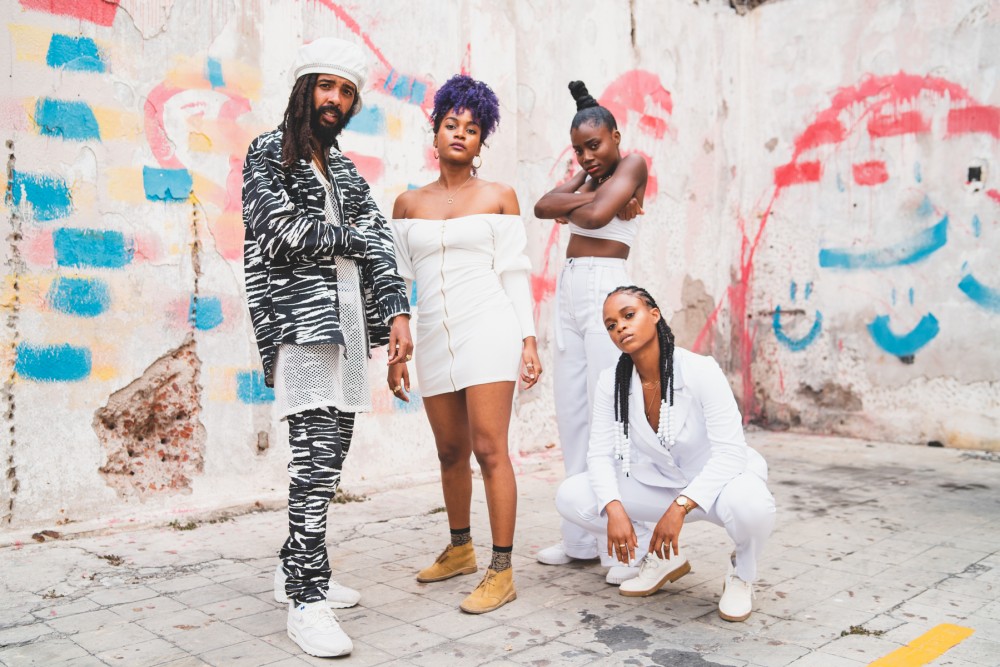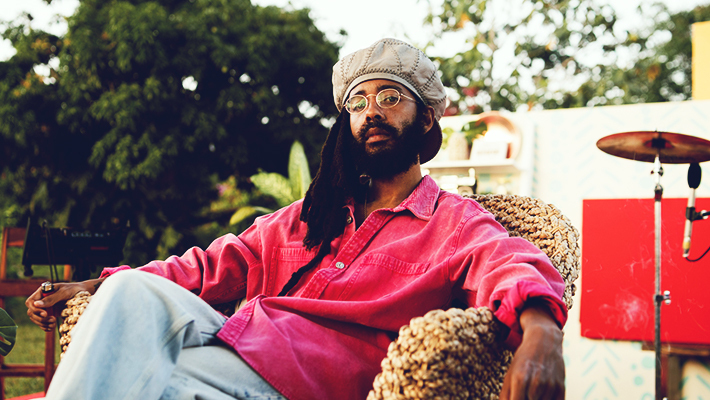When Protoje first announced the partnership between his In.Digg.Nation Collective label and RCA Records/Six Course in April, it naturally called for celebration. RCA is not only supporting the reggae star, but the rest of his collective: Lila Iké, Sevana, and new signee Jaz Elise. But as with many artists across the globe, the events of the last year forced them to reconfigure their entire promotional strategy.
Founded in 2014, In.Digg.Nation Collective is Protoje’s beloved brainchild after years of being dismissed from recording studios. The following year, he signed Sevana after hearing her cover of Amy Winehouse’s “Back To Black” on SoundCloud. Lila Iké joined after Protoje’s assistant introduced them at his private album listening in 2017. Just last month, Jaz Elise was brought into the family by Iké’s suggestion.
“I wanted to be like Jay-Z growing up, in terms of the business side. He always stressed that it’s important that you have a stake in your music,” Protoje tells Uproxx of his longtime goal of securing a label deal. Autonomy was always on top of mind, with each artist etching a coveted line in their contract: owning their masters.
“It makes sense now because this is all we have,” he continues. “See, now we’re not touring. It’s important for my artists to feel like they are working on their own stuff. So I want them as invested [as me].”

The investment has paid off, as the RCA deal included three releases: Iké’s debut The ExPerience EP in May (which funnels the sound of ‘90s roots reggae artists like Garnett Silk and Sizzla through a modern lens), Sevana’s sophomore Be Somebody EP in July (that highlights the singer’s sultry, ‘90s R&B-inspired bedroom vocals) and Protoje’s fifth album In Search Of Lost Time (a self-reflective journey through love, spirituality, and fatherhood) in August.
But Jamaica’s lockdown halted plans for the In.Digg.Nation Collective. “I remember imagining going on tour for my first project and getting the opportunity to be on different platforms like Spotify and actually do face-to-face interviews,” Iké tells Uproxx. “So we had to just think of different creative ways to get that done.”
The timing of these projects has led to even more unity among In.Digg.Nation Collective. “I’d say pound for pound, nobody’s really messing with Jamaican music talent. But I think the platform has always been an issue,” Protoje explains. “I know what it’s like to be an artist wanting to be a part of something. It’s not about making money, it’s about letting them be able to sustain themselves. If I’m performing at a show, they’re making noise and boosting me up. So that’s just the culture I try to form.”
“I can actually say, ‘I need help in this department and I’d love your input here.’ It’s something that is done hassle-free,” Iké, who recalls Sevana helping her perfect harmonies, explains. “I really love the communal energy in the studio. It’s not about, ‘Well if I do this, it’s ensured I get five percent.’ It’s nothing like that.”
This unity has now extended way beyond the artists, as they’ve elected local talent to collaborate with. By opting not to outsource (save for the mainstream label affiliation), the artists are cultivating a homegrown ecosystem that has kept vibrant ideas and money cycling through Jamaica’s entertainment industry. This includes producers like Winta James and Izybeats, glam squads for Sevana and Iké, and Protoje’s creative director Yannick Reid.
“This is the longest stretch I’ve been in Jamaica since I started working with Protoje in 2014,” Reid tells Uproxx. “I’m kind of ready to see the world again but I’m so excited about what was going on in Jamaica. As tough as this year is overall for everybody, it’s genuinely been one of my best years professionally. I have really been able to achieve a couple of noteworthy milestones, which I give thanks for.”
Reid’s presence has been boosted due to the events of 2020: along with executing all of Protoje’s music videos and album visualizers, he directed Koffee’s “Lockdown” video (which has gained over 30 million YouTube views) as well as her recent international campaign for MasterCard. A graduate of Edna Manley College of the Visual and Performing Arts whose mother is an interior decorator and father is a photographer, Reid typically gets his best ideas from attending local parties. Now that he’s had to adapt, he is using other elements of the country as inspiration. “Sometimes we can walk past the things that are really insignificant because we’re so used to them. We don’t stop and say, ‘Hey, let me frame this,’” he explains. “As ordinary as it feels to me, when you see them somewhere else, you think, ‘Oh my God, that reminds me so much of home.’ I really try to bring the background to the foreground in my work.”
But it’s natural that this year has caused an increase in stress levels, which Sevana is navigating through. The singer had to shoot her “Mango” music video within a 12-hour timespan before curfew so the crew could get home safely, and she felt relief that she could rely on a creative solution locally.
“Jamaica has an incredible pool of just people who are so talented, just world-class. As far as the things that we’re able to produce, that’s one of the fruitful things that has come out of being in quarantine,” she tells Uproxx. “When you’re forced to stay in your country, you work with the talent that’s there and they get a whole new platform. People from all over get to see the work that we’re doing, not just strictly Jamaicans. I love that.”
The outfits for the “Mango” video was birthed from Sevana’s Pinterest board, which she showed to her brother (who doubles as a tailor). He, along with Iké’s designer Shampagne and local designer Kadian Nicely (who is responsible for the video’s unforgettable fluffy yellow dress), connected with Sevana’s stylist Ayana Riviére to make it all happen.
“There’s definitely a lot of really great side effects that have resulted from this,” Sevana continues. “My makeup artist, stylist, and preferred producer live here. Understanding that traveling is a risk to most, we just had to call on our own people and bounce things off their minds. You get to be real too, because everybody knows it’s a really difficult time.”
For Iké, the restrictions made her and creative director Nickii Kane create a production for August’s NPR’s Tiny Desk performance. “I didn’t want to just sit at home with my guitar with a few band members,” she explains. “I really wanted it to be a look. It was also the first time I was performing the songs from the EP with the band, so I was very excited to hear how it sounded.”
“My NPR performance is impactful because of what my creative director did with the lighting, what the stylists did with my outfit and because of the musicians,” Iké continues. “I couldn’t have had that much success if I was just doing it by myself. It’s very nice to see that people are actually appreciating the other aspects of what makes the music what it is. A lot of times people get so caught up in the artists. They don’t necessarily understand that I can’t do what I am supposed to do without the help of all of these very important people.”
Jamaica is overflowing with creativity that is often diminished due to a lack of resources. 2020 is now offering them a platform to showcase their talent, and Reid is making it a priority to be a leader. “When I’m working with Protoje, I always try to bring somebody new. I’ll say, ‘I know you’re interested in being a cinematographer. Just stand up beside me and any questions you have about the camera I answer them,’” he explains. “So they get all the information while they’re working on something — and they’re getting paid. As these people get better, they get booked more. That is just how we keep the dollars getting around the industry. Everybody gets a fair share.”
Reid is also the creator of content platform Very Culture and the manager of New Wave, which celebrate all facets of Jamaican talent: DJs, photographers, producers, designers, musicians and more. “We need to document these people so that we’ll have rich tapestry moving forward,” he says. “Protoje is an artist, but who are the producers behind him? I’ve been thinking in terms where our scholars are looking to create literature about the stuff that we’re doing. If we do it properly, they will have resources to reference.”
Protoje is also using his newfound American connections to spark change, especially when it comes to streaming. Apple Music was recently launched in Jamaica, while Spotify is still not available. “When I went to Spotify’s offices, I told them we have to get this done. We’re in positions now to be in these rooms,” he explains while also noting that Jamaican artists could get more coverage by American journalists by choosing to release more albums than singles. “By the time these changes come into play, a young artist coming out next year gets to start his career with it.”
In.Digg.Nation Collective has helped create a community that will have everlasting results, but they cannot do it alone. There are now opportunities for the Jamaican government to pitch in, where they can help fund music education (Iké suggests workshops that teach artists development and publishing) as well as building larger infrastructure that rivals the ones overseas. ”When I travel and see the different venues that are available for artists to [perform], it’s very beautiful,” Iké says. “For a country like Jamaica, where I feel like we have contributed so much to music history, those are things we really need to work on developing.”




